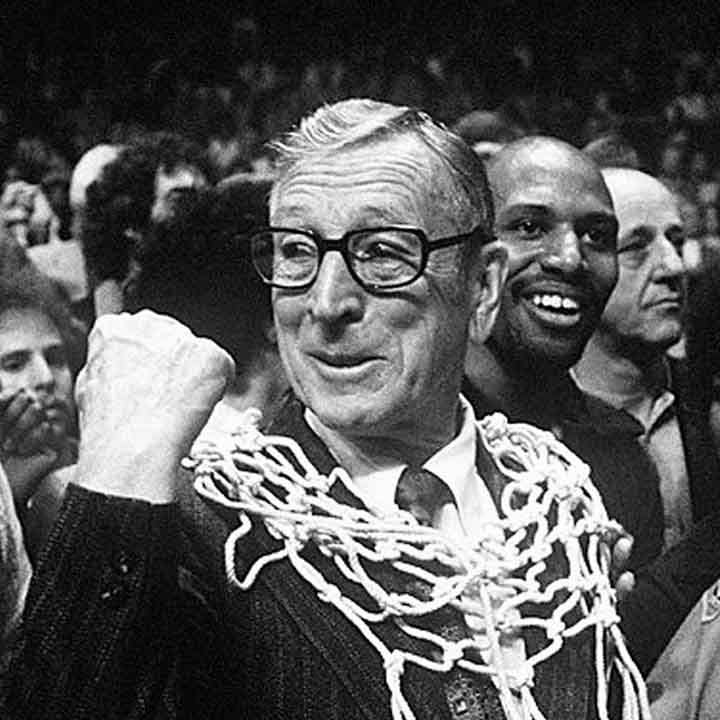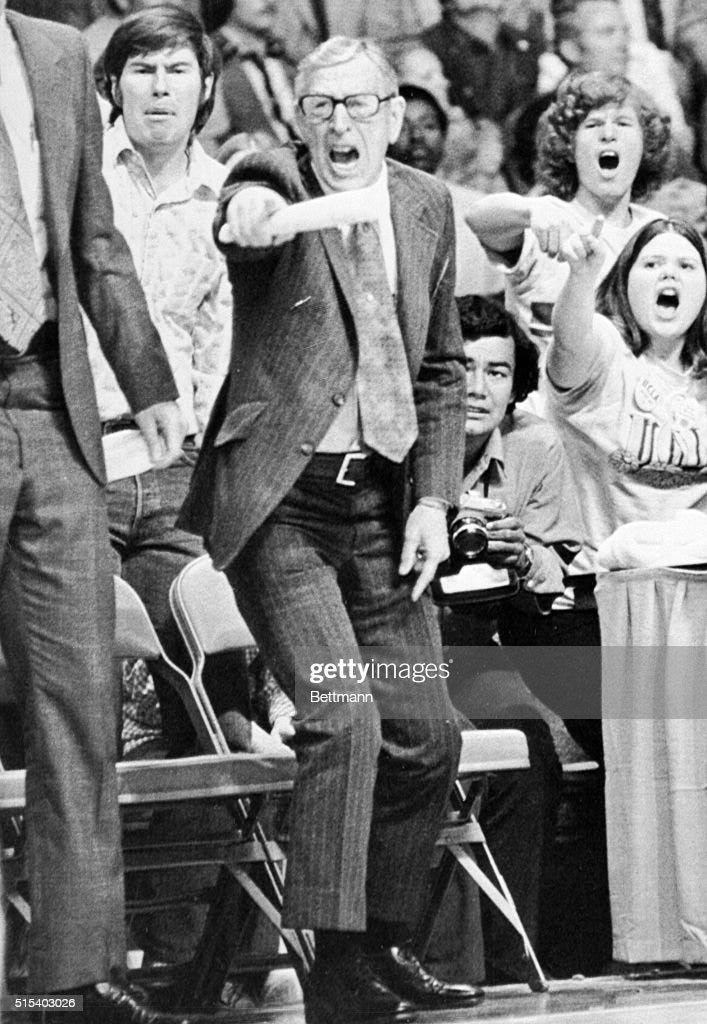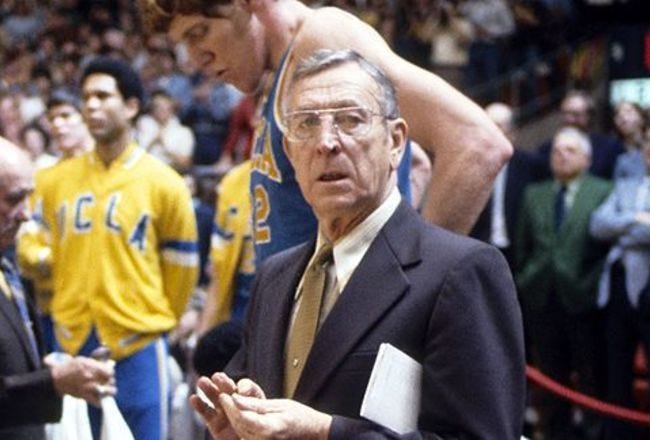3 Surprising Things You Probably Don't Know About John Wooden
The image of John Wooden as a kindly old coach who believed in the sound fundamentals of basketball belies a truth that most don’t know about the competitive man…
“Once you know what it is in life that you want to do then the world basically becomes your library. Everything you view, you can view from that perspective, which makes everything a learning asset for you.”
I’ve often said that coaching is a perfect blend of so many different things: regulating emotions, commanding physical effort, growing individual relationships, managing group dynamics, understanding theory, applying things practically, and so much more. Because coaching is a cross-section of all these divergent thoughts and concepts it means that there’s so many spheres of overlap with so many different things.
So it’s no surprise that one of the easiest ways to learn about coaching soccer is by learning about coaches in different sports, and this past week I did just that when I read Wooden: A Coach’s Life by Seth Davis. It’s about 550 pages and reads well, I would highly recommend it to anyone who’s interested in learning more about the Wizard of Westwood (a moniker that Wooden strongly disliked I might add).

There is a narrative aura that’s come to surround Coach Wooden – portraying him as a near saint-like figure who stayed above the fray of messy competitiveness – and there is some truth behind it. He was a devout Christian man from the Midwest, he was passionately devoted to his wife (Wooden once told a friend that him and his wife “made love” every day. Although true to his conservative upbringing, in his mind that phrase meant he and his wife either held hands, kissed, or said “I love you” to each other every day), and was a stickler for basic behavior decorum.
While I’m about to jump into some of the details that reveal what’s underneath that veneer, I don’t do it as a way to criticize the past coach or call him hypocritical. It’s the opposite in fact. I think it’s amazing that he had this competitive drive and that he managed to stay true to high ethical standards and laudable comportment.
1. Criticizing Referees and Opposing Players
Perhaps one of the most surprising things to learn about John Wooden is that he was a jerk sometimes, and that manifested itself in how he spoke to referees and players on the opposing team. He’d sit at the end of the bench using a curled up game program to amplify his voice as he directed a running diatribe of harassment against the referees for the entire game.
But it didn’t end there. He would do the same for opposing players as well. Wooden wanted to get in the opponents’ heads, shaking their confidence and creating an environment that made it hard for them to get into any sort of flow state. He never broke the rules, but he would do anything else he could to get a competitive advantage.
During half-time or after a game, Wooden would find the officials and apologize to them. In his book, Davis framed it as Wooden presenting a choice to the referees: They could call it how they saw fit and get an angry Wooden who berated and insulted them in return, or they could change their perception of the game and get a Wooden who was polite, genial, and otherwise a pleasure to have on the sideline.
Later in his life Wooden reflected on his behavior towards the officials and had feelings of regret about it, noting that he would hate it if somebody had talked to him that way.
2. Wooden Fought
Wooden was not afraid of a fight. When he played collegiately and on the professional circuit, he was not afraid to come up swinging against bigger players when he lost his temper, and that fiery mentality carried into his coaching.
Beyond physically fighting others, he would also get into big arguments with the players at UCLA. He would shout and criticize players, and players would laugh when they saw the papers describing Wooden as a calm, level-headed coach. The players knew that the journalists saw only one piece of the puzzle and that their coach was capable of being a very angry man.
One of the memorable stories from Davis’ book came from Wooden’s early coaching days when one of his players got into it with an opponent. Wooden urged his player not to retaliate, but instead wait for a moment to get his revenge later in the game.
That time came when there was a few minutes left in the match. When the ball was being inbounded and the referees were distracted, Wooden’s player took his chance and punched the opponent in the stomach so hard that he felt the guy’s spine (that little detail is why this story stuck out with me). The referees didn’t know what happened, but everyone else in the gym saw it and Wooden said nothing. All he did was make eye contact with his player and give tacit approval of what he did.
3. His Own Ego Still Got in the Way
One of the hardest parts of coaching is dealing with your own ego, and that’s true for every coach. Even when Wooden had the best intentions, there were still times when his ego got in the way. Perhaps the clearest example was after he retired from coaching but still kept an office on the UCLA campus, which clearly made it harder for the next coach to assert his influence with Wooden’s literal and metaphorical shadow still over the program.
This was only compounded when Coach Wooden talked to the press, making comments that implied the team was under-performing under the new coach and that the team would be doing better if he were still coaching.
Lastly, there is some controversy around the success of Wooden’s in-game tactics. His assistant coach was the one who suggested they move to a zonal press that was so key to their run of 10 National Championships but Wooden never gave him credit for it in public. That seed of discontent grew over time until that assistant coach left the program, both of their families got involved and came to resent each other, and the issue was never paved over.
Once again, I’m not writing any of this just to dunk on a famous coach. It’s more to point out that coaching is hard, and even arguably the best coach of all time still had his faults, and that’s the nature of life. And all of these criticisms exist precisely because John Wooden was also the opposite of all of these things as well. He could get players to reconsider decisions not by berating them but just by asking a simple question. He may have been a fighter but he was also tremendously respectful and believed in obeying rules. He may have had an ego, but when Kareem Abdul-Jabbar and Bill Walton joined UCLA, he spent the off-season talking to other collegiate coaches to learn how they ran their offenses with big post players. He was a lifelong student and believed his greatest gift was teaching.
There’s so many ideas caught up in these contradictions that revolve around what it means to compete, how socially accepted behaviors change in the world of sport, and much more. But I’ll save those thoughts for another time and just end by saying if you want to learn a bit more about one of the greatest American coaches of all time, swing by your library and pick up a copy of Wooden: A Coach’s Life.





